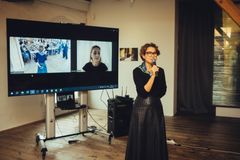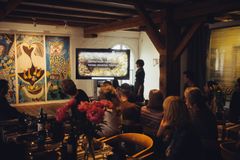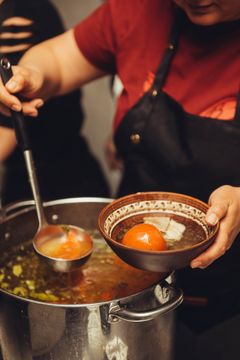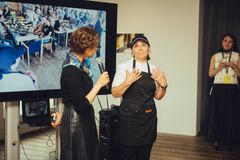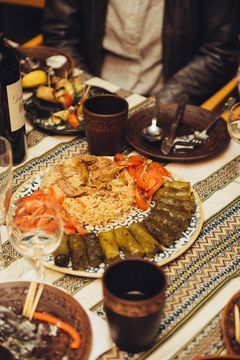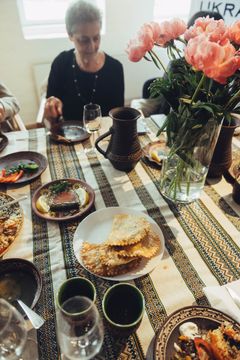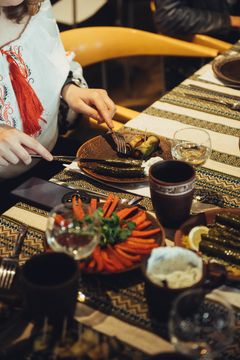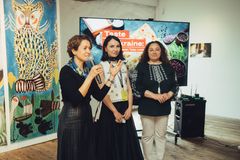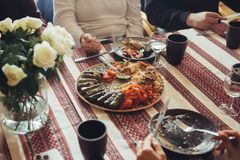“Taste of Ukraine”: An Evening of Remembrance and Solidarity with the Crimean Tatar People
On May 25, Ukraine House in Denmark hosted a special edition of its series “Taste of Ukraine”, dedicated to the Crimean Tatar people—their history, their struggle, and their resilient identity. The event took place in the shadow of May 18 which marks the deportation of Crimean Tatars by the Soviet regime in 1944, a historical trauma that continues to shape the destiny and identity of Ukraine’s indigenous people.
More than a dinner, the evening became a space of communal remembrance, a moment to pause and confront the long history of oppression and reflect on the enduring fight for identity and belonging.
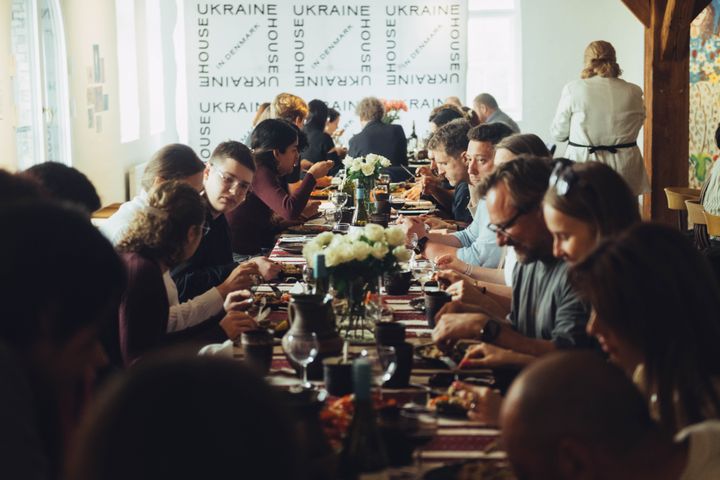
The deportation of 1944 was more than an episode of forced relocation—it was an act of cultural and physical erasure, a genocide. During the event, participants heard reflections on this historical trauma and its intergenerational impact offered by Gulnara Abdulayeva, a Crimean Tatar historian and author. She talked about her people not just as an academic subject but as a living memory carried by families, passed through silence, stories, and survival:
“There wasn’t a single Crimean Tatar family that wasn’t affected by the deportation. Even in my own family—just women—survived however they could. This wasn't just history. It’s a living wound passed from generation to generation.”
Entire families were uprooted from their homeland in Crimea, given minutes to gather their belongings, and transported in cattle cars to unfamiliar lands in Central Asia. Nearly half of those deported perished due to hunger, disease, and the brutal conditions of exile. This was not only a tragedy for a people, but a wound to Ukrainian history itself—one that still bleeds today under Russia’s ongoing occupation of Crimea, and the repression of Crimean Tatars who remain on the peninsula.
“The Soviet deportation of the Crimean Tatars was carried out under the false pretext that an entire people had betrayed the Soviet Union. As a result, all Crimean Tatars—including women, children, and the elderly—were collectively punished, exiled from their homeland, and forced to live for decades under a stigma of treason. They endured systemic discrimination and social exclusion simply for being who they were ethnically and culturally. What’s especially striking today is that even many of the most liberal Russians remain unwilling to confront the legacy of these crimes. They refuse to acknowledge the injustice of Soviet-era atrocities or to accept any sense of collective responsibility for the wars of aggression launched by Russian leadership in the past and present,” says Nataliia Popovych, chairperson of Ukraine House in Denmark.
An important moment of the evening was paying tribute to the Crimean Tatar dissidents, including Mustafa Dzhemilev, a symbol of non-violent resistance, moral courage, and the Crimean Tatar national movement. From his youth, Dzhemilev resisted Soviet lies and fought for the right of his people to return to their homeland—facing imprisonment, surveillance, and exile in the process.
His example is not only part of Crimean Tatar history, but of the broader Ukrainian narrative—a testament to the power of principle in the face of empire. His story served as a reminder that the fight for dignity can persist across borders, generations, and political systems.
In 1991, the Crimean Tatars re-established their national assembly, the Kurultai, and elected the Mejlis, their representative body. That same year, they made a choice that remains fundamental: “The Crimean Tatars decided to be part of an independent Ukraine. Because the Crimean Tatars know their history very well and they remembered very well our common history with Ukraine, which lasted for more than three hundred years, and we lived next to each other and had a lot in common. Crimea is a part of Ukraine.” (Gulnara Abdulayeva)
Though food was served, it was not the focus but tools that preserve Crimean Tatar identity. Dishes such as shurpa, veal pilaf, dolma, chibereki, mercimek and fultu were edible stories—reminders of lost kitchens, recovered traditions, and the strength to preserve a culture in exile.
Two chefs from the celebrated Musafir restaurant in Kyiv, Zemfira and Tetyana, who traveled to Copenhagen for the event, brought more than just food and their talent, but the memory of home, the language of heritage, and the sensory expression of continuity of Crimean Tatar culture of hospitality, where every guest is a dear guest. We thank them for sharing their national cuisine and its unique flavors with us.
During the evening, Gulnara Abdulayeva also touched on the current challenges faced by Crimean Tatars (and also Ukrainians) under Russian occupation:
“Today, there are many political prisoners in Crimea—Ukrainians and Crimean Tatars alike. But disproportionately, it is the Crimean Tatars who suffer. We are still fighting. We remain in our homeland, asserting our right to exist. And despite 11 years of occupation, Crimea is still waiting for Ukraine.”
Repression, disappearances, imprisonment, and the criminalization of cultural and religious identity remain daily realities for those under occupation.
This edition of “Taste of Ukraine” proved once again that cultural events are not peripheral—they are central to national memory, identity, and diplomacy. The evening served as a reminder that history lives on in the voices of those who remember and the actions of those who resist. As Ukraine continues its struggle for liberation and justice, events like these help ensure that the stories of indigenous peoples like the Crimean Tatars are heard and never forgotten.
Images
About Ukraine House
The Ukraine House in Denmark is a civil society organisation of Ukrainian cultural diplomacy based in Copenhagen. Its mission is to form an enduring positive influence of Ukraine on Ukrainian-Danish cooperation, security, and lasting peace in Europe.
Subscribe to releases from Ukraine House in Denmark
Subscribe to all the latest releases from Ukraine House in Denmark by registering your e-mail address below. You can unsubscribe at any time.
Latest releases from Ukraine House in Denmark
Ukraine House in Denmark Presents: “Uncurtained: Ukrainian Art in Danish Collections 1989-2023” Exhibition21.7.2025 08:00:00 CEST | Presseinvitation
August 21 – November 23, 2025 Curated by Kateryna Stukalova Ukraine House in Denmark is proud to present “Uncurtained: Ukrainian Art in Danish Collections 1989–2023”, a landmark exhibition and major research project exploring the rich, yet often overlooked, history of Danish-Ukrainian cultural relations. Through the lens of Ukrainian artworks acquired by private, public, and corporate Danish collections over the past three and a half decades, Uncurtained offers a unique perspective on the artistic and historical ties between the two nations and proves that current strong Danish support for Ukraine is not a recent development.
“The Ukrainian Model” — Rethinking Resilience for a New Era6.7.2025 10:29:48 CEST | Pressemeddelelse
Ukraine House in Denmark hosted Ukrainian civic strategist Yevhen Hlibovytskyi for a critical examination of how Ukraine is surviving the war—and what its experience reveals about the future of governance, democracy, and resilience in the 21st century. The event took place on June 24.
“Material Resistance: Ukrainian Design in Action” Exhibition: Ukraine House in Denmark at 3daysofdesign 202527.6.2025 08:00:00 CEST | Pressemeddelelse
Thank you to everyone who visited Ukraine House in Denmark during this year’s 3daysofdesign festival in Copenhagen. Since joining the festival in 2023, Ukraine House has become both a cultural landmark and a vital platform for showcasing contemporary Ukrainian design. Our historic space in the heart of Copenhagen once again welcomed visitors from around the world, hosting exhibitions, conversations, and moments of solidarity during the festival’s three vibrant days — June 18 to 20.
Ukraine House in Denmark presents “Material Resistance: Ukrainian Design in Action” Exhibition for 3daysofdesign in Copenhagen13.6.2025 08:00:00 CEST | Presseinvitation
From June 18 to 20, 2025, Ukraine House in Denmark will present “Material Resistance: Ukrainian Design in Action”, a collective exhibition showcasing innovative and resilient Ukrainian design as part of Copenhagen’s prestigious 3daysofdesign festival. The project is organized in partnership with the Library of Ukrainian Materials, the Ukrainian Association of Furniture Makers, and the design fair Material Matters (London).
Language as a Weapon: Confronting the Kremlin’s Rhetoric of Hate and Incitement to Genocide10.6.2025 08:00:00 CEST | Press release
As Russia wages war on the battlefield, it also wages a mental war of hate and disinformation. At Ukraine House in Denmark, a panel of leading experts came together to reveal how Kremlin-sponsored hate speech and disinformation are not only deepening Russia’s war against Ukraine—but may themselves constitute international crimes.The panel examined how language becomes weaponized: how it dehumanizes, distorts, and incites. This is not just about information manipulation—it is about cultivating moral indifference to atrocity.
In our pressroom you can read all our latest releases, find our press contacts, images, documents and other relevant information about us.
Visit our pressroom

